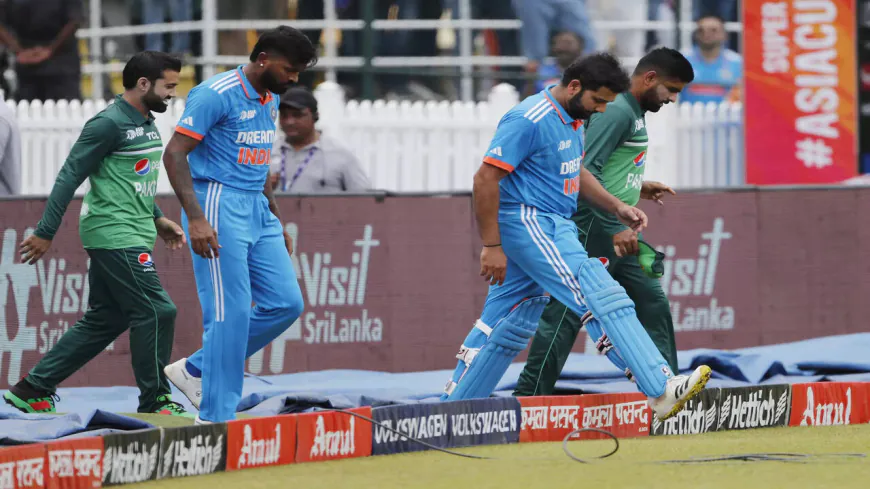Should India Compete Against Pakistan In Asia Cup 2025 Amid Political Tensions? Manoj Tiwary Believes Otherwise
Former cricketer Manoj Tiwary asks for the India-Pakistan conflict in Asia Cup 2025 following recent terrorist attacks in India. The match is set for September 14 but public angst is building up. Should cricket give way to national security?

The impending Asia Cup 2025 is again making headlines not only for the cricketing spectacle that it will present but also due to the political tensions involved. The Asian Cricket Council has already made the schedule public and the game on everyone's lips is India versus Pakistan. Tagged to be played on September 14 in the UAE the confrontation has already generated controversy. Former Indian cricket player Manoj Tiwary has expressed deep concern regarding the game particularly following recent cases of violence in India. He is of the strong opinion that the match should not take place this time considering the recent terrorist strike at Pahalgam that took innocent lives.
Tiwary feels that it would be extremely insensitive and wrong to play against Pakistan in such a situation. He mentioned that the situation in the country is still tense and Operation Sindoor is in progress. Referring to Prime Minister Narendra Modi’s strong message in the Lok Sabha where he clearly stated that India will not tolerate any threat to its sovereignty and will respond strongly Tiwary asked how it is even possible to talk about playing a match with Pakistan when the country is still dealing with the aftermath of a terror attack. His remark has ignited debate around the country and among cricket fans who now wonder if politics and cricket can actually be kept apart in such circumstances.
India and Pakistan have been drawn in Group A with UAE and Oman. Group B has Sri Lanka Bangladesh Afghanistan and Hong Kong. The tournament will begin on September 9 with Afghanistan playing Hong Kong in the first match. India will start their campaign on September 10 a day after against UAE. The big-ticket encounter against Pakistan is scheduled just a couple of days later on September 14. India's last group match will be against Oman on September 19. After that the leading two teams from all the groups will move into the Super 4 stage and the tournament will end with the final on September 28.
Tiwary's perspective is not based on competition but on emotion and national feeling. He articulated that he has respect for the game but believes that the country's feelings and the protection of civilians must be more important than any game. To him the prospect of playing cricket against Pakistan soon after a terror attack does not make sense. He challenged the rationale of making such a decision stating that the emotions of the nation need to be honored particularly when lives have been lost and families are still grieving. His statement is in line with the sentiment among many Indians that the timing of the match disturbs them and questions whether cricket has to go on against such a background.
The statement by PM Modi also lent greater credibility to Tiwary's argument. While speaking during a session in the Lok Sabha, the Prime Minister cautioned Pakistan and reminded the nation of the continuing anti-terror operations. It was made perfectly clear that India would not retreat if challenged and that any aggressive action would be answered with a strong response. Tiwary seconded the same by asking how it is possible to justify a sporting event with Pakistan when Operation Sindoor is still being conducted. According to him, it gives the wrong message not only to the people of India but to the rest of the world as well.
This is not the first that sports between India and Pakistan have been affected by political or military tension. Previously India has stood strongly by refusing to play bilateral series against Pakistan on similar grounds. Most people believe that cricket must be a unifier but in such moments when passions run high and national pride is at stake the game can no longer be isolated from the political climate. The Asia Cup is a significant tournament but the issue here is whether this specific match must proceed when the scars of an act of terrorism are still fresh.
Although the official calendar stays the same growing public discourse could pressure the authorities to reconsider. Players' safety the mood of the public and the prevailing geopolitical environment all require careful consideration. Fans themselves are also not unanimous. Others believe that politics must be kept out of sports and that these matches can ease tensions while others are with Tiwary and insist national interest and respect for the victims should take priority.
The tournament itself has much to promise with formidable teams fighting it out and closely contested fixtures scheduled. The Super 4 round and the final on September 28 have much high-quality cricket on offer. But the focus continues to be on the India-Pakistan confrontation and if it would be hosted as planned. Since the two nations share a long and complex history such meetings are always fraught with passion. This time though the demand for cancellation is stronger than ever and supported by a recent disaster.
Ultimately it all comes down to one huge question. Can a cricket match proceed when the country is still recovering from a lethal attack and when feelings are raw. Tiwary's comment might not be everyone's opinion but it does echo a genuine concern that many are considering but not voicing. Whether the match takes place or not the controversy surrounding it has already started and it is sure that this year's Asia Cup will be remembered for more than just cricket.



 admin
admin